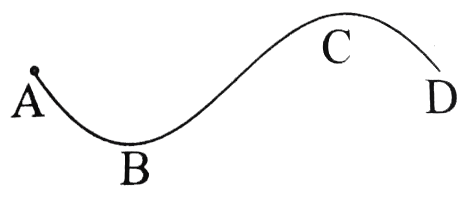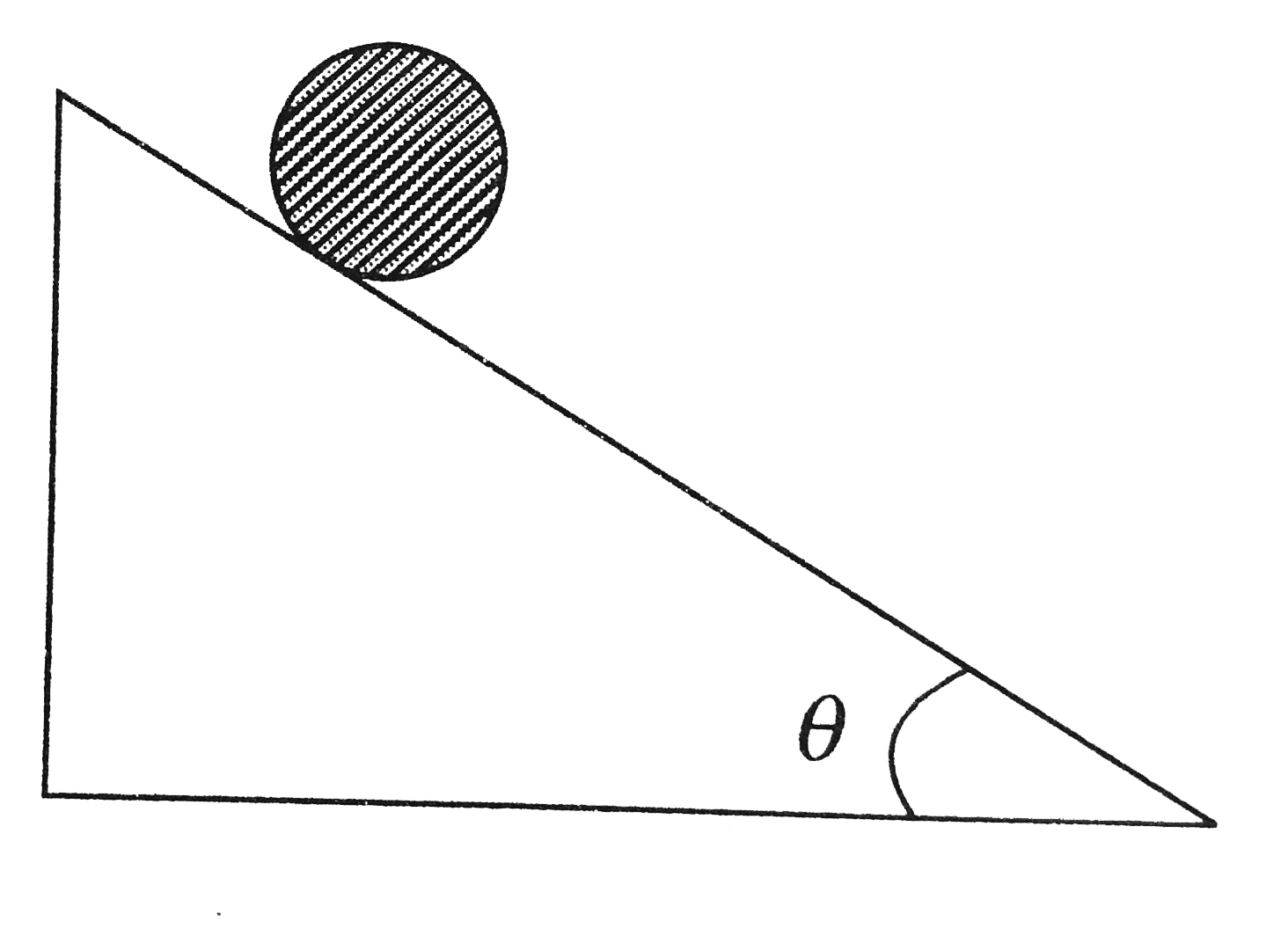A curved surface is shown in figure. The portion BCD is free of friction. There are three spherical balls of identical radii and masses. Balls are released from rest one by one fromA which is at a slightly greater height than C.

With the surface AB, ball 1 has large enough friction to cause rolling down without slipping, ball 2 has a small friction and ball 3 has a negligible friction
For balls which do not reach point D, which of the balls can reach back to point A?
Ball-1 and ball-2 do not corss over C so they turn back. But none of them can reach to point A. Because of loss of energy due to friction ball-2 cannot reach back to A. Ball-1 has rotational motion in reverse direction, which does not enable it to rise back to A due to kinetic friction.
Topper's Solved these Questions
- WORK AND ENERGYBOOK - MTG IIT JEE FOUNDATIONCHAPTER - WORK AND ENERGYEXERCISE - Exercise (Integer/Numerical Value Type)
5 Videos
- WORK AND ENERGYBOOK - MTG IIT JEE FOUNDATIONCHAPTER - WORK AND ENERGYEXERCISE - Olympaid/HOTS Corner
20 Videos
- WORK AND ENERGYBOOK - MTG IIT JEE FOUNDATIONCHAPTER - WORK AND ENERGYEXERCISE - Exercise (Subjective Problems short Answer Type)
16 Videos
- THRUST AND PRESSUREBOOK - MTG IIT JEE FOUNDATIONCHAPTER - THRUST AND PRESSUREEXERCISE - Olympiad/HOTS Corner
15 Videos
Similar Questions

A curved suface is shown in figure. The portion BCD is free of friction. There are three spherical balls of identical radii and masses. Balls are released from rest one by one from A which is at a slightly greater height than C.
Wioth the surface AB, ball 1 has large enough friction to cause rolling down without slipping, ball 2 has a small friction and ball 3 has a negligible friction.
(a) For which ball is total mechanical energy conserved?
(b) Which ball(s) can reach D?
(c )For ball which do not reach D, which of the balls can reach back A?
View Solution
A curved suface is shown in figure. The portion BCD is free of friction. There are three spherical balls of identical radii and masses. Balls are released from rest one by one from A which is at a slightly greater height than C.
Wioth the surface AB, ball 1 has large enough friction to cause rolling down without slipping, ball 2 has a small friction and ball 3 has a negligible friction.
(a) For which ball is total mechanical energy conserved?
(b) Which ball(s) can reach D?
(c )For ball which do not reach D, which of the balls can reach back A?
View Solution
Knowledge Check

A curved suface is shown in figure. The portion BCD is free of friction. There are three spherical balls of identical radii and masses. Balls are released from rest one by one from A which is at a slightly greater height than C.
Wioth the surface AB, ball 1 has large enough friction to cause rolling down without slipping, ball 2 has a small friction and ball 3 has a negligible friction.
(a) For which ball is total mechanical energy conserved?
(b) Which ball(s) can reach D?
(c )For ball which do not reach D, which of the balls can reach back A?A1 and 2B1C2DCannot be predictedIf a body (ball) is rolling on a surface without slipping, no frictional force acts on it
In the case of rolling without slipping point of contacts are relatively at rest.AStatement-1 is True, Statement-2 is Ture , Statement -2 is a correct explanation for statement -1.BStatement-1 is True, Statement-2 is True , Statement-2 is NOT a correct explanation fro Statement -1.CStatement-1 is True, Statement-2 is False.DStatement-1 is False, Statement-2 is True.A homogeneous ball is placed on a plane making an angle θ with the horizontal. At what values of the coefficient of friction μ the ball roll down the plane without slipping ?
 .A≥27gtanθB≥25gtanθC≥23tanθD≥34tanθ
.A≥27gtanθB≥25gtanθC≥23tanθD≥34tanθ
Assuming a ball of mass m and of radius r to roll down from the top without slipping. Neglect energy losses due to rolling friction.
View SolutionThere are 2 identical white balls, 3 identical red balls and 4 green balls of different shades. The number of ways in which they can be arranged in a row so that atleast one ball is separated from the balls of the same colour, is :
View Solution(a) Write rules of friction. Friction force decreases in ball bearings because balls are spherical. Does it mean frictional force depend upon area ? Explain.
View SolutionA ball is rolling without sliding down an incline. Is the force applied by the ball on the incline larger than or less than its (ball’s) own weight ?
View SolutionFriction is lessened in ball-and-socket joint by
View Solution
